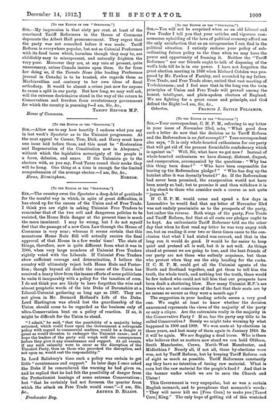[To THE EDITOR OF THE "SPECTATOR. "]
Srn,—The country owes the Spectator a deep debt of gratitude for the manful way in which, in spite of great difficulties, it has stood up for the causes of the Union and of Free Trade. I think you are right in asking Unionist Free Traders to remember that of the two evil and dangerous policies to be resisted, the Home Rule danger at the present time is much the more imminent. I may be wrong, but I do not myself feel that the passage of a new Corn Law through the House of Commons is very near; whereas it seems certain that this monstrous Home Rule Bill will actually receive the final approval of that House in a few weeks' time! The state of things, therefore, now is quite different from what it was in 1906, when very large numbers of Unionist Free Traders rightly voted with the Liberals. If Unionist Free Traders show sufficient courage and determination, I believe the country will ultimately reject both Home Rule and Protec- tion; though beyond all doubt the cause of the Union has received a heavy blow from the insane efforts of some politicians to unite it inseparably with a policy for the taxation of corn. I do not think you are likely to have forgotten the wise and almost prophetic words of the late Duke of Devonshire at a Liberal-Unionist gathering as long ago as 1887. They are not given in Mr. Bernard Holland's Life of the Duke. Lord Hartington was afraid lest the guardianship of the Union should come to be regarded as the business only of ultra-Conservatism bent on a policy of reaction. If so, it might be difficult for the Union to stand.
"I admit," he said, "that the possibility of a majority being returned, which could force upon the Government a retrograde policy with regard to commercial matters, would be a danger so great as would threaten to endanger the Unionist cause ; and I hope the leaders of the party will weigh well the consequences hefore they give it any countenance and support. At all events, if any such calamity were to occur as the disruption of the Unionist Party, then on those who provoked the disruption, and not upon us, would rest the responsibility."
In Lord Salisbury's time such a policy was certain to get little " countenance and support." In later days I once asked the Duke if he remembered the warning he had given us, and he replied that he had felt the possibility of danger from the Protectionist leanings of some extreme Conservatives but "that he certainly had not foreseen the quarter from which the attack on Free Trade would come."—I am, Sir,
Freshwater Bay.
ARTHUR D. ELLIOT.


















































 Previous page
Previous page